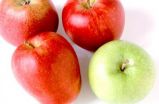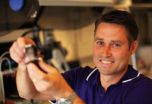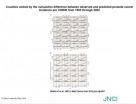(Press-News.org) In the study, which was conducted by researchers from the University of Gothenburg, Sahlgrenska University Hospital and the Norwegian Institute of Public Health, the participants completed a scientifically evaluated questionnaire about what they had been eating and drinking since becoming pregnant.
The researchers also had access to information about the women's general lifestyle e.g. level of education, living conditions, income, weight, physical activity, smoking habits, alcohol consumption, number of children and medical factors such as history of preterm delivery.
15 % lower risk
The results show that the group of women with the 'healthiest' pregnancy diet had a roughly 15 % lower risk of preterm delivery compared with those with the most unhealthy diet. The correlation remained after controlling for ten other known risk factors for preterm delivery.
'Pregnant women have many reasons to choose a healthy diet with lots of vegetables, fruit, whole grain products and some types of fish, but this is the first time we can statistically link healthy eating habits to reduced risk of preterm delivery,' says Linda Englund-Ögge, researcher at the Sahlgrenska Academy, University of Gothenburg.
Associated with complications
Preterm delivery, defined as spontaneous or induced delivery before the end of gestational week 37, can be associated with acute and long-term complications and is a major problem in modern maternity care. Measures to prevent preterm delivery are therefore of high priority.
Should this lead to revised dietary recommendations for pregnant women?
'No, and it is not harmful to occasionally eat something unhealthy. But our study shows that the dietary recommendations given to pregnant women are important,' says Englund-Ögge:
'Dietary studies can be very complex. Any given food item may contain a wide range of substances and is usually consumed together with other foods. This makes it difficult to find out its exact effects of one single food. We show that there is a statistically established link between a healthy diet and reduced risk of preterm delivery, but our study wasn't designed to identify any underlying mechanisms.
Encourage healthy eating habits
Englund-Ögge says that studies of the overall dietary pattern and the total quality of the foods consumed are important complements to coming studies of how single food items affect the risk of preterm delivery. The researchers are hoping that the study will inspire doctors, midwives and others who work with pregnant women to encourage healthy eating habits.
INFORMATION:
The title of the article is Maternal dietary patterns and preterm delivery - results from large prospective cohort study. Date of publication in BMJ: 4 March.
Link to the article: http://www.bmj.com/content/348/bmj.g1446
ABOUT THE STUDY
The researchers used a type of analysis that considers how different food items are interrelated. This is a technique where a computer searches for foods that co-vary with each other. Each woman is assigned a score for how strongly she adheres to the three identified dietary patterns:
'Prudent': High consumption of boiled and raw vegetables, fruits, berries, whole grain products (bread, cereal), oils for cooking, yoghurt, dried fruit, nuts, water as beverage etc.
'Western': Salty and sweet snacks, French Fries, processed meat products, sugary beverages, cookies, ketchup, buns etc.
'Traditional': High consumption of fish products (for example fish balls and fish burgers), lean fish (for example cod and haddock), boiled potatoes, gravy, margarine, low-fat milk, cooked vegetables etc.
Contact:
Linda Englund-Ögge
doctoral student at the Sahlgrenska Academy
University of Gothenburg
Tel.: +46 (0)733 421 201
Mobile: +46 (0)733 421 201
E-mail: linda.englund-ogge@vgregion.se
Healthy eating may reduce the risk of preterm delivery
2014-03-10
ELSE PRESS RELEASES FROM THIS DATE:
Computer system simulates the behavior of tax evaders
2014-03-10
Tax fraud is a very serious problem for society, especially in Spain, where tax evasion represents almost one-fourth of its Gross Domestic Product. On the one hand, evasion is a problem because it produces a loss in public resources, something which is especially difficult in a time of economic crisis with cutbacks in public funding; on the other hand, tax fraud damages the effectiveness of justice within the tax system, since not everyone is able to evade taxes equally, thus leading to injustices between small and large companies and between the self-employed and employees. ...
New sugar-test to reduce false-positive cancer diagnoses
2014-03-10
The world's most widespread test for ovarian cancer reports false-positives in 94 of 100 diagnosed cases. Now, chemists at the University of Copenhagen working with clinical researchers at University College London have developed a method able to halve the number of false-positives. When fully developed, the new test will spare a significant number of women from unnecessary worry and further testing. Furthermore, global health care providers stand to save substantial sums – just by including a test on a certain sugar molecule in tandem with the currently prevailing diagnostic ...
There is no beating the breathalyzer this St. Patrick's Day (video)
2014-03-10
WASHINGTON, March 10, 2014 — If you're having some drinks this St. Patrick's Day weekend, remember to have a designated driver, otherwise you may end up on the business end of a breathalyzer on the side of the road. If you think you can beat it, think again; chemistry will land you in cuffs. In the American Chemical Society's (ACS') latest Reactions video, we examine how your breath can get you busted when you've had too much to drink. The video is available here: http://youtu.be/rvVzlg26bCM
Subscribe to the series at Reactions YouTube, and follow us on Twitter @ACSreactions ...
Europe must improve its response to the threat of plant pests and diseases
2014-03-10
Potentially devastating plant pests and diseases are highlighted in a new report from EASAC, the European Academies' Science Advisory Council, the leading provider of independent scientific advice to Europe's policy-makers. In the detailed EU-wide study of emerging plant pests and diseases, EASAC describes their combined threat to crops and forests and wider ecosystems, with implications for human health. In economic terms, as admitted by the EU Commission, billions of euros could be at stake and the environmental impact may be irreversible. Prof. Anne Glover, Chief Scientific ...
Young skin cancer survivors at risk of other cancers later
2014-03-10
Australian author on the paper, Professor Rodney Sinclair, Professor of Medicine at the University of Melbourne and Director of Dermatology at Epworth HealthCare said that the risk decreased significantly with increasing age, but it remains higher compared with individuals who have never had NMSC.
"The risk for developing any cancer subsequent to NMSC decreases significantly with increasing age: 23 times higher risk for those under 25 years of age; 3.52 for those 25-44 years of age; 1.74 for those 45- 59 years of age; and 1.32 for those older than 60 years.
Published ...
Rice synthetic biologists shine light on genetic circuit analysis
2014-03-10
In a significant advance for the growing field of synthetic biology, Rice University bioengineers have created a toolkit of genes and hardware that uses colored lights and engineered bacteria to bring both mathematical predictability and cut-and-paste simplicity to the world of genetic circuit design.
"Life is controlled by DNA-based circuits, and these are similar to the circuits found in electronic devices like smartphones and computers," said Rice bioengineer Jeffrey Tabor, the lead researcher on the project. "A major difference is that electrical engineers measure ...
New high-tech glasses detect cancer cells during surgery
2014-03-10
A team of scientists at Washington University School of Medicine in St. Louis (WUSTL) and the University of Arizona (UA) in Tucson led by Samuel Achilefu have created a pair of high-tech glasses that help surgeons visualize cancer cells during surgeries, which glow blue when viewed through the glasses.
Achilefu published the 2013 article he coauthored as part of a special section in the SPIE Journal of Biomedical Optics on fluorescence molecular imaging that details the development of the high-tech glasses (available via open access in the SPIE Digital Library).
Achilefu, ...
Where nothing grows anymore
2014-03-10
Jena (Germany) Vast fields of sunflowers, sprawling pine trees and slim cypresses, as well as vineyards as far as the eye can see – these are typical memories of Tuscany for all those who have been there. By contrast, Professor Dr. Beate Michalzik from the Friedrich Schiller University of Jena and her colleagues are interested in the more barren aspects of the region in Central Italy: In a study the Jena geographers analyzed the condition of the soil in the region known as 'Crete Senesi' between Florence and Grosseto, whose hills are typically characterized by erosion – ...
Employers 'routinely discriminating against stammerers'
2014-03-10
Employers are routinely discriminating against people who stammer, rejecting them because of concerns about possible negative reactions from customers or team members, new research suggests.
A study by Dr Clare Butler, of Newcastle University Business School, published in the journal Work, Employment and Society says that people who stammer experience widespread prejudice in the jobs market.
Thirty-six men from England and Wales, ranging in age from 21 to 65 years, were interviewed and all reported routine discrimination. Some had been immediately rejected at interviews ...
PSA-testing and early treatment decreases risk of prostate cancer death
2014-03-10
Mortality in prostate cancer is lower in areas with frequent use of PSA testing compared with areas with little testing shows a study published online today in Journal of the National Cancer Institute by researchers from Umeå University, Sweden and Memorial Sloan Kettering Cancer Center, New York, NY, USA.
The study is based on data from nation-wide, population-based registers in Sweden including the Cancer Register, The Cause of Death Register and the National Prostate Cancer Register (NPCR) of Sweden.
"Our results show that prostate cancer mortality was 20 procent ...





